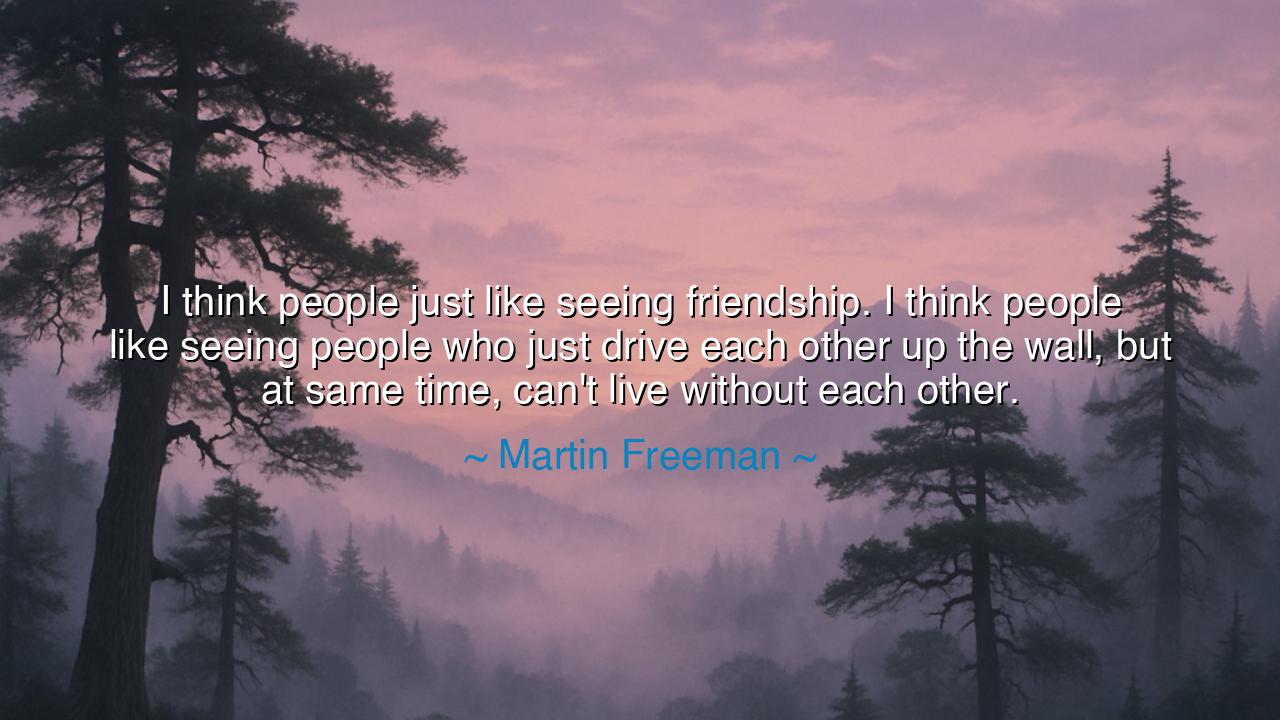
I think people just like seeing friendship. I think people like
I think people just like seeing friendship. I think people like seeing people who just drive each other up the wall, but at same time, can't live without each other.






In the sagas of the ancient world, the bonds between people were often tested in the fires of conflict, yet it was through these trials that the most profound relationships were forged. Martin Freeman, reflecting on the nature of friendship, captures this deep truth when he says: "I think people just like seeing friendship. I think people like seeing people who just drive each other up the wall, but at the same time, can't live without each other." These words ring true to the heart of human experience—the tension that exists between conflict and connection, between moments of frustration and the unspoken, unbreakable ties that bind us. It is a truth as old as time itself, for in every great friendship or partnership, there exists the push and pull that both challenges and sustains us.
In the ancient epics, we see countless examples of relationships that were anything but smooth—Achilles and Agamemnon, David and Saul, Hector and his brother-in-arms, Ajax. These were not the friendships of ease, but of challenge, rivalry, and often tension. The bond between Achilles and Patroclus, though marked by moments of anger and disagreement, was one of deep loyalty and love. Despite the driving forces that at times tore them apart, their ultimate connection remained unshaken. Even when Achilles was enraged by Agamemnon's arrogance, his dedication to the Greek cause—and to the friendship he shared with others—remained the bedrock of his actions. Just as Freeman describes, these characters could not live without each other because the conflict between them revealed their deep interdependence.
Freeman’s words also touch upon a powerful dynamic of human nature—the tension between independence and dependence. This dynamic is beautifully illustrated in the stories of Gilgamesh and Enkidu. The two heroes’ friendship was born from a place of antagonism—at first, they fought, each pushing against the other’s strength, yet in their rivalry, they found mutual respect and trust. Gilgamesh, the king, who had once been unchallenged in his arrogance, found his equal in Enkidu, and together, they achieved greatness. In the shared frustration and challenge of their early encounters, they found a deeper bond—one that became inseparable. This conflict, far from driving them apart, made them stronger, for it was through these moments of tension that they learned the depth of their connection.
This dynamic is one that all of us can recognize. In our own lives, friendships and relationships often involve moments of frustration and irritation—moments when we feel that we can no longer bear the presence of the other. But in those moments, we are often faced with the deeper truth that we cannot live without them. Just as Freeman describes, the push of rivalry and irritation is balanced by the pull of the unbreakable bond of friendship. This is not a mere romanticized view of relationships; it is a profound understanding that the strongest connections are often built on the tension between individuals who challenge each other and yet find their greatest strength in their union.
Consider the legendary friendship between David and Jonathan. Though they came from different families and had contrasting roles—one a warrior, the other a prince—they found in each other a deep connection that transcended the conflicts between their fathers. Their friendship was not free from tension; Saul’s jealousy of David created a rift that tested their bond. Yet, in the end, David and Jonathan could not be torn apart, for they saw beyond their differences to the core of what they shared. Their friendship, though marked by challenges, endured because it was built on a foundation of mutual respect and loyalty. Even in moments of conflict, they found themselves drawn back together by a bond stronger than political allegiances or personal pride.
The lesson here is profound: friendship, true friendship, is not always easy. It is born from the push and pull of opposing forces, from the moments of irritation and frustration that, when navigated with patience and understanding, become the very bedrock of a deep connection. Just as Freeman reflects on the dynamics of friendship that drive people “up the wall,” so too do we find that the strength of these bonds is often tested by moments of struggle, only to emerge stronger and more resilient. Friendships that are forged in such fires are not easily broken—they are resilient and capable of withstanding the challenges that life throws their way.
In our own lives, we must remember that it is in the moments of frustration and conflict that our most important relationships often grow. Instead of walking away at the first sign of difficulty, let us embrace the tension and find the deeper meaning in our connections. Like Gilgamesh and Enkidu, like David and Jonathan, we are called not to shy away from the struggles in our relationships, but to lean into them, knowing that through them, we will find strength, growth, and a bond that can withstand anything. And in doing so, we will create friendships that not only survive the trials of life but thrive because of them.






AAdministratorAdministrator
Welcome, honored guests. Please leave a comment, we will respond soon